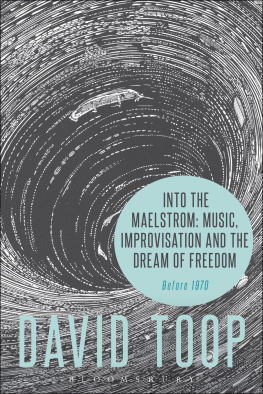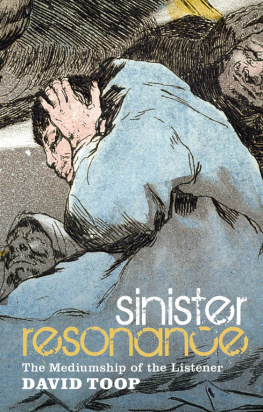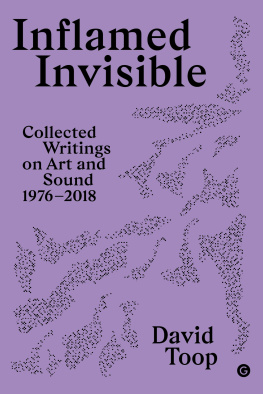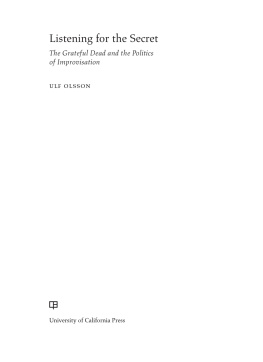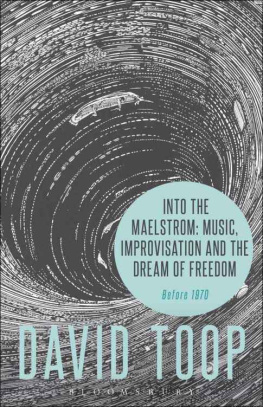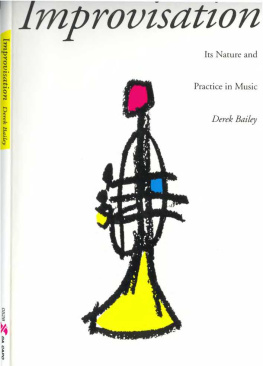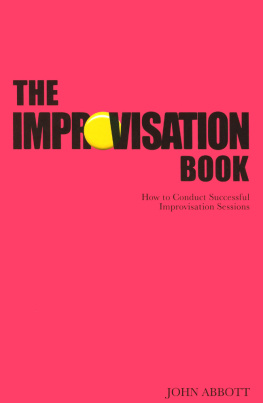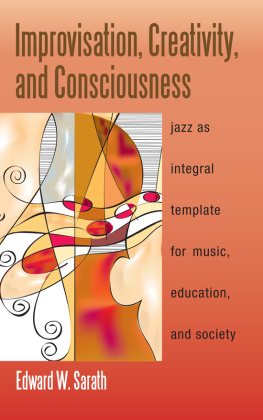Toop - Into the maelstrom: music, improvisation and the dream of freedom: before 1970
Here you can read online Toop - Into the maelstrom: music, improvisation and the dream of freedom: before 1970 full text of the book (entire story) in english for free. Download pdf and epub, get meaning, cover and reviews about this ebook. City: New York;London;Oxford;New Delhi;Sydney, year: 2016, publisher: Bloomsbury USA;Bloomsbury Academic, genre: Religion. Description of the work, (preface) as well as reviews are available. Best literature library LitArk.com created for fans of good reading and offers a wide selection of genres:
Romance novel
Science fiction
Adventure
Detective
Science
History
Home and family
Prose
Art
Politics
Computer
Non-fiction
Religion
Business
Children
Humor
Choose a favorite category and find really read worthwhile books. Enjoy immersion in the world of imagination, feel the emotions of the characters or learn something new for yourself, make an fascinating discovery.
Into the maelstrom: music, improvisation and the dream of freedom: before 1970: summary, description and annotation
We offer to read an annotation, description, summary or preface (depends on what the author of the book "Into the maelstrom: music, improvisation and the dream of freedom: before 1970" wrote himself). If you haven't found the necessary information about the book — write in the comments, we will try to find it.
Toop: author's other books
Who wrote Into the maelstrom: music, improvisation and the dream of freedom: before 1970? Find out the surname, the name of the author of the book and a list of all author's works by series.
Into the maelstrom: music, improvisation and the dream of freedom: before 1970 — read online for free the complete book (whole text) full work
Below is the text of the book, divided by pages. System saving the place of the last page read, allows you to conveniently read the book "Into the maelstrom: music, improvisation and the dream of freedom: before 1970" online for free, without having to search again every time where you left off. Put a bookmark, and you can go to the page where you finished reading at any time.
Font size:
Interval:
Bookmark:

INTO THE MAELSTROM: MUSIC, IMPROVISATION AND THE DREAM OF FREEDOM
INTO THE MAELSTROM: MUSIC, IMPROVISATION AND THE DREAM OF FREEDOM
Before 1970
David Toop
Bloomsbury Academic
An imprint of Bloomsbury Publishing Inc

CONTENTS
thinking before acting
acting before thinking
acting in darkness
Humming in the background of all life and familiar and alien as breathing is improvisation. Even the most regulated life has its perpetual micro-incidents of improvisation, periodically spiked by volcanic eruptions of haphazard behaviour that release pressure. Settled situations are continually disrupted by crises both grave and petty; life, like improvised music, is a disturbing conflict between predictability and contingency. In this sense, composition may be the more utopian strategy, since one of its intentions is to counter our fear of catastrophe with orderly outcomes.
Sit, do nothing: this is improvisation. Allow stray thoughts, inner tremors, sensory impressions to pass through the body. To listen is to improvise: sifting, filtering, prioritizing, placing, resisting, comparing, evaluating, rejecting and taking pleasure in sounds and absences of sounds; making immediate and predictive assessments of multilayered signals, both specific and amorphous; balancing these against the internal static of thought. From moment to moment, improvisation determines the outcomes of events, complex trajectories, the course of life. Humans must learn to improvise, to cope with random events, failure, chaos, disaster and accident in order to survive. Yet as an antithesis to this improvisational necessity, we find an insidious culture of management strategy, militaristic thought, planning and structured goals expanding through all social institutions, a desperate grasping at simplistic political antidotes to global and economic instability. In this context, the central role of improvisation in human behaviour is consistently devalued.
A music exists that embodies the strange dream or nightmare of a life almost entirely improvised, a life that is given a setting in which to unfold, an instrument through which to articulate its unfolding, a time of beginning and a time of ending. Companions exist to share in this experiment skilful, responsible, committed but also impossible individuals, if only because the dream of freedom is so implausible, its practice so difficult, its nature so slippery and its reception within broader society so hostile and uncomprehending.
Yet improvisation stripped of the structuring principles that make jazz or Indian ragas so instantly recognisable is not exclusively chaotic and anarchic, any more than music tied to those principles is necessarily formulaic. Some years ago I was invited to perform with a Los Angeles group called Extended Organ. I was deputizing for artist Mike Kelley, unavailable for a trip to London at that time. All but one member of the group were old friends from the days when I first came across the Los Angeles Free Music Society Tom Recchion, Fredrik Nilsen and Joe Potts. Paul McCarthy I had never met before but I knew his work. As we were setting up and sound checking, never once discussing what we might do or making any plans for the concert, I watched McCarthy organizing his small collection of lo-fi electronic devices. He looked like a person encountering the world for the first time, struggling to make sense of the intractable behaviour of earthly phenomena. I had to remind myself: this is one of the most successful artists of our times, a man who creates works on an industrial scale, directing huge teams of technicians to craft extraordinarily ambitious installations and sculptures. The results may be messy, scatological, grotesque and shocking, yet he is capable of withstanding the constant pressure of negotiations, finance, deadlines and organisational logistics. On stage he looked like a man who couldnt open a box without help. It was as if this group allowed a glimpse into the generative aspect of his character, the inchoate imagination out of which these works grow.
Speaking personally, improvisation allows me openness, allows me the range of my character to be quiet, to be receptive, to be brutish, to be analytical, to be stupid, to stop and be still and so on. In communality with others who are also experiencing that self-allowance I can go beyond the edges of my character (to find that character is an edgeless construction). I also forego the option of telling others what to do or entraining them to my purpose. That I believe to be a good thing. I am forced to find contingent settlements that are not compromises, forced into acceptance of what is not mine, obliged in public and in the unfolding of an event to find meaning in an aesthetic that may not be my own. Perhaps forced is too strong a word because improvisers choose to be in their situation but improvisation without some degree of obligatory self-examination can become very content with itself and subsequently less vital.
In certain respects improvisers have something in common with surgeons, chemists, biological researchers or quantum physicists a fascination and total absorption in phenomena that are relatively unattached to conventions of beauty, ugliness, boredom, even moral judgement or logic. I wonder what happens if I listen closely, push in the direction of my listening, follow and lead at the same time, maybe find myself in a world which is like an alien landscape even though I know it to be of this world. Of course a surgeon must be mindful of the patient, not kill the body, but then that is also true of the improviser.
What does it mean, I ask myself, if I can walk on stage to play in a group, sit next to one member Paul McCarthy, say who I have never met before, sit next to another member who I have known for forty years but rarely get to see, and then we play with great intensity and closeness, shadowing each other without imitation, enabling each other, exploring violence or absence, tenderness or impermeability, without censure? Many limitations are hidden within this formulation. This is something I try to draw out with students. What is going on under the surface with this activity that has been described as free? What are the hidden rules, the unspoken constraints?
If I work at instruments, at materials, then I find something within myself that is otherwise dormant and that quality has a social component. It is communicable and has the strength to move outward to others who may wish to engage with it in their own way. That may be simplistic but its constructive aspect, both on a personal and social level, is almost miraculous by comparison with current ideas of democracy in which participation is promised yet hollow. Improvised music has survived in this way since the early 1960s and it continues to attract new generations. That suggests that it embodies a way of living that is necessary, even if only for a minority, and so it persists as anomaly, as conscience, as critique and as refuge.
Music is happening all the time
This is a book about beginnings: not only the beginnings of scenes, musical histories and significant historical moments but also a state of beginning to play without knowing what will be played, how it will develop, how long it will be played, what form it will take, how it will end and how it will be resumed.
First a word about my approach. I am not so interested in overarching theories or dogmas of improvisation. My original intention was to scrutinize and contextualize a music that has been misunderstood and disparaged since its inception. As the writing progressed I found myself increasingly fascinated by its elusive origins and the way in which fundamental questions about the nature and limits of freedom, control and self-organization have been addressed by musicians and non-musicians of sharply contrasting backgrounds and philosophies. At a certain point it became evident there was too much material. Rather than trying to condense this into one volume I decided to expand into two. This first volume is largely devoted to events prior to 19689; the second will begin with overlapping material from the second half of the 1960s, particularly developments in Germany, the Netherlands and Japan, followed by the so-called second generation and continuing to the present, though there is no clear divide. As an inhalation of breath throughout both volumes I enfold contemporary practice and more general themes audiences, solos, voice, the subjectivities of group playing into a convoluted and no doubt contentious arc of historical development. Many musicians who began playing in the 1960s continue into the present. The timeline is fluid and reversible.
Font size:
Interval:
Bookmark:
Similar books «Into the maelstrom: music, improvisation and the dream of freedom: before 1970»
Look at similar books to Into the maelstrom: music, improvisation and the dream of freedom: before 1970. We have selected literature similar in name and meaning in the hope of providing readers with more options to find new, interesting, not yet read works.
Discussion, reviews of the book Into the maelstrom: music, improvisation and the dream of freedom: before 1970 and just readers' own opinions. Leave your comments, write what you think about the work, its meaning or the main characters. Specify what exactly you liked and what you didn't like, and why you think so.

